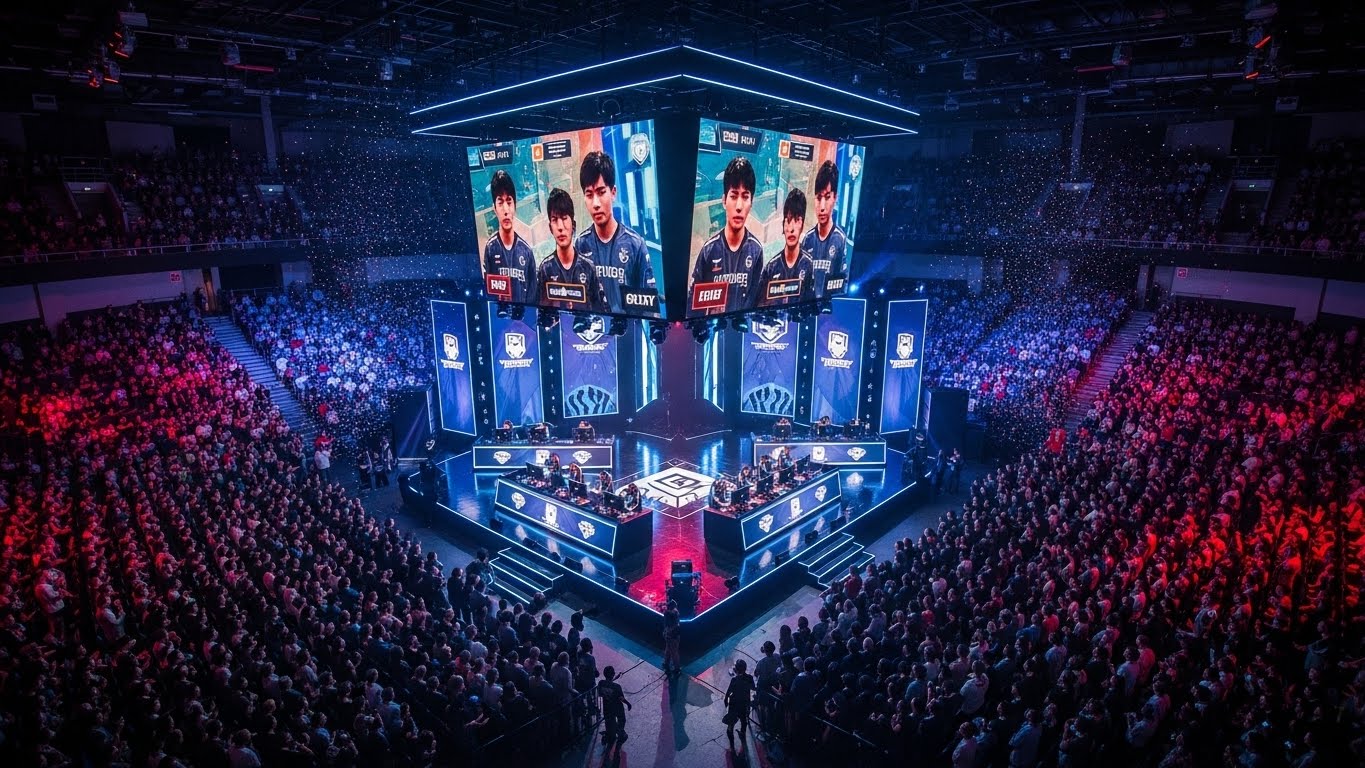In the modern entertainment landscape, few phenomena have captured the world’s attention as powerfully as esports. What began as a niche activity among gamers has quickly transformed into a global multibillion-dollar industry. Esports now rivals traditional sports in terms of viewership, sponsorship deals, and prize money, drawing millions of fans and participants from all corners of the globe. From packed stadiums to digital arenas filled with viewers, esports has reshaped the way we understand competitive entertainment.
This blog post delves into the rise of esports, its explosive growth, the impact it has had on global culture, and what the future holds for the world of competitive gaming.
The Origins and Growth of Esports
Esports, or electronic sports, refers to organized, multiplayer video game competitions, particularly between professional players, individually or in teams. While competitive gaming has existed in some form for decades, esports as we know it today began to take shape in the late 1990s and early 2000s. Early competitive gaming tournaments were small affairs, often held at local events or through LAN (local area network) connections. These were largely informal and involved passionate hobbyists competing for bragging rights rather than substantial prizes.
The early 2000s saw the emergence of internet gaming platforms, such as Battle.net for StarCraft, and tournaments like the World Cyber Games and DreamHack, which helped bring competitive gaming to a larger audience. These events began to garner attention and attract sponsorships, laying the groundwork for the esports industry that would take off in the next decade.
As broadband internet became more accessible, esports tournaments grew in scale, with more players, higher stakes, and larger audiences. The introduction of League of Legends in 2009, Dota 2 in 2013, and Counter-Strike: Global Offensive in 2012 marked the beginning of a new era for competitive gaming, turning esports into a global spectacle.
Today, games like League of Legends, Dota 2, Fortnite, Overwatch, and Counter-Strike dominate the competitive gaming landscape, with global tournaments offering millions in prize money and attracting millions of viewers online.
Why Esports Has Grown So Rapidly
Several key factors have contributed to the rapid growth and mainstream acceptance of esports, transforming it from a fringe hobby into a dominant cultural and economic force.
- Increased Accessibility to Gaming
The most significant driver behind the rise of esports is the accessibility of gaming itself. Unlike traditional sports, which require specialized equipment and physical space, esports can be played by anyone with a computer, console, or even a mobile device. As gaming technology became more affordable and accessible, more people were able to engage in both playing and watching competitive gaming.
Esports is no longer confined to high-end gaming PCs; mobile games like PUBG Mobile and Clash Royale have opened up competitive gaming to a wider, more diverse audience. As internet speeds improve globally, people from all regions, including developing countries, are now able to participate in or watch esports events online.
- The Rise of Streaming Platforms
Streaming platforms such as Twitch, YouTube Gaming, and Facebook Gaming have become essential to the esports ecosystem. These platforms allow gamers to stream their gameplay in real-time to a global audience, making it easy for fans to watch and interact with players directly. Esports tournaments, once limited to physical venues or television broadcasts, are now streamed live to millions of viewers worldwide.
The interactive nature of streaming has further fueled the rise of esports. Fans can engage with their favorite players, ask questions, and support streamers through donations or subscriptions. The ability to participate in live chat during streams makes the experience feel more communal, allowing fans to be part of the event in real-time, no matter where they are in the world.
- The Role of Social Media and Online Communities
Esports has built a thriving community of passionate fans and players, and social media platforms like Twitter, Instagram, and Reddit play a vital role in keeping the community engaged. These platforms provide fans with direct access to players, teams, and tournament organizers, allowing for constant interaction and updates.
Esports fans are highly invested in the games and players they follow. They participate in online forums, share videos and memes, analyze game strategies, and support their favorite teams and players. This sense of community has helped esports flourish, as it fosters a dedicated and enthusiastic fan base.
- Massive Sponsorships and Advertisements
Esports has become a highly profitable business, attracting sponsorships from major corporations across industries. Brands from outside the gaming world, such as Coca-Cola, Intel, and Mercedes-Benz, have entered the space, recognizing the massive potential to reach young, tech-savvy consumers. Sponsorship deals for esports teams, individual players, and events can run into millions of dollars.
The rise of esports has also opened new advertising opportunities. Major tech companies, such as NVIDIA and Alienware, have made esports a central part of their marketing strategies, tying their brand identities to the competitive gaming world. This influx of sponsorship money has elevated esports to the level of traditional sports in terms of commercial viability.
Esports Players: From Hobbyists to Global Stars
The world of esports is home to a growing group of highly skilled players who are not only experts in their games but also celebrities in their own right. These professional gamers often start their careers as casual players, honing their skills in online games and eventually making their way to local tournaments. From there, many players are signed to esports teams or organizations, where they are trained and compete in global events.
Top players can earn substantial incomes, not only from tournament prize money but also from sponsorships, streaming, and brand deals. Players like Lee “Faker” Sang-hyeok, a South Korean League of Legends legend, and Tyler “Ninja” Blevins, who made a name for himself playing Fortnite, have become household names, making millions from their gaming careers.
In addition to gaming, many players have become influencers, with large social media followings and the ability to shape the trends within the esports community. Their success has helped elevate esports as a legitimate career path, attracting young talent from around the world.
Esports Tournaments and Events
The most exciting aspect of esports is the tournaments. These events draw players, teams, and spectators from around the world to compete for glory and massive prize pools. The format of these tournaments varies from game to game, but they all share one thing in common: a high level of competition and excitement.
Some of the most popular esports events include:
- The International (Dota 2):
This annual tournament is one of the most prestigious in esports, offering prize pools that often exceed $30 million. The competition attracts the best Dota 2 teams in the world and is watched by millions of fans across multiple streaming platforms. - League of Legends World Championship:
League of Legends is one of the biggest esports titles globally, and its World Championship is the crown jewel of the competitive scene. The tournament draws massive crowds, and the final matches are watched by millions. - Fortnite World Cup:
The Fortnite World Cup was a landmark event, with a $30 million prize pool and a massive viewership. It brought competitive gaming to the mainstream and showed how esports can reach beyond traditional gaming audiences.
Esports tournaments are often held in massive arenas, with sold-out crowds of fans cheering on their favorite teams. The energy in these venues rivals that of major traditional sports events, and the production value is on par with professional sporting leagues.
The Business of Esports
Esports is rapidly becoming a multibillion-dollar industry. The revenue generated from advertising, sponsorships, streaming rights, ticket sales, and merchandise is growing year by year. According to industry reports, global esports revenues are projected to reach over $1 billion annually in the coming years.
The growth of esports has created new business opportunities in areas such as broadcasting, event management, player training, and game development. Major media companies are investing heavily in esports broadcasting rights, while gaming developers are constantly looking for ways to improve the competitive experience for players and spectators.
Esports organizations, like Team Liquid and Cloud9, have also evolved into global brands with a significant presence in multiple games. These organizations sign players, train teams, and manage events while building a loyal fan base around their brand. With increasing investment from venture capital and multinational companies, esports is well on its way to becoming a permanent fixture in the entertainment landscape.
The Challenges Ahead for Esports
Despite its rapid growth, esports faces several challenges that must be addressed to ensure its long-term success.
- Sustainability of Player Careers
The career lifespan of a professional esports player is often relatively short. Many players retire by their late 20s due to physical and mental strain. Esports organizations must develop better systems for player welfare, ensuring that players are given the support they need to manage their careers and transition into new roles after retirement. - Diversity and Inclusion
While esports is a global community, it still faces challenges when it comes to diversity and inclusion. Women, in particular, are underrepresented in competitive gaming, and there is ongoing work needed to make the esports scene more inclusive for players of all genders and backgrounds. - Maintaining Fairness
As esports grows in value and visibility, concerns about cheating, match-fixing, and unethical practices arise. Developers and tournament organizers need to establish stronger safeguards to ensure that competitions remain fair and transparent.
The Future of Esports
The future of esports looks incredibly promising. With continued growth in viewership, sponsorship, and investment, esports is set to become an even more significant part of the entertainment industry.



